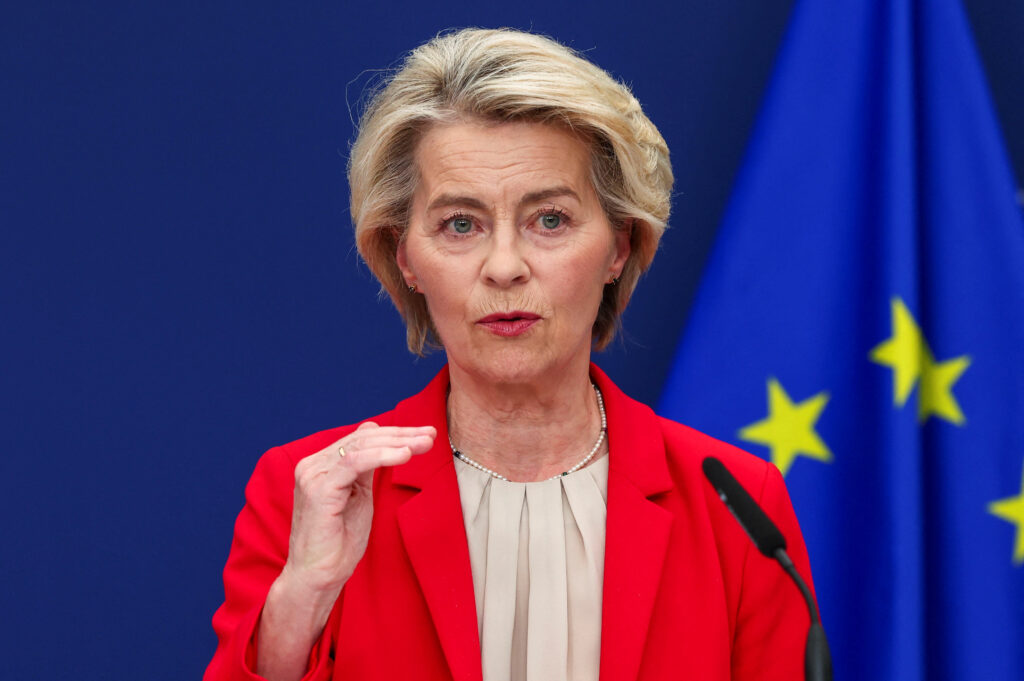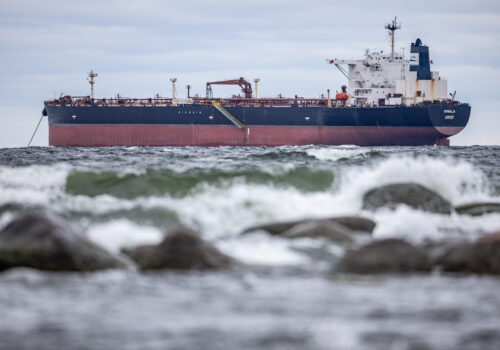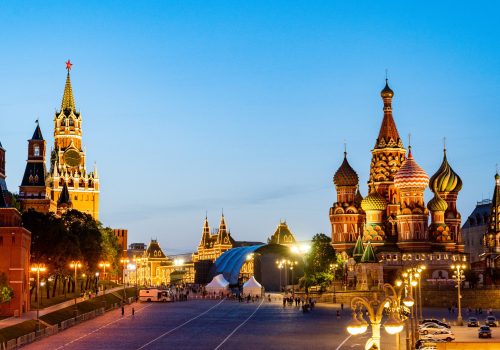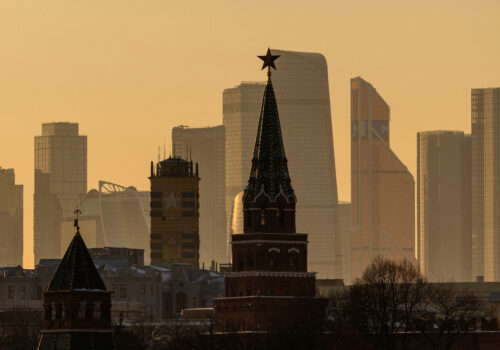“Strength is the only language that Russia will understand.” That’s what European Commission President Ursula von der Leyen said Tuesday as she unveiled a proposed eighteenth European Union (EU) sanctions package against Russia for its war on Ukraine. Among the proposals are a ban on transactions with Russia’s Nord Stream gas pipelines, additional sanctions on more than twenty Russian banks, and a lowering of the oil price cap from sixty dollars to forty-five dollars. Approval for the package now rests with the twenty-seven EU member states, and some elements of the package, such as lowering the oil price cap, could prove contentious this coming weekend at the Group of Seven (G7) meeting in Canada. Below, our experts explain what was announced and what is at stake.
1. What impact would this proposal have on the Nord Stream gas pipelines?
This package could put the final nail in Nord Stream 2’s coffin, providing a much overdue, decisive vision for the future of Russian pipeline flows to Europe. Ending this zombie project debate once and for all also sends a clear message to global liquefied natural gas producers, which may be hesitant to expand partnerships with the European buyers as long as a relapse to Russian gas dependence is a possibility. This checkmate move from the European Commission still needs approval from EU member states, as well as watertight language on sanctions implementation to prevent caveats or exemptions. Moreover, the Commissions’s bold action on Nord Stream 2 brings the Commission’s Roadmap to fully end EU dependency on Russian energy closer to reality, just as the roadmap’s legislative proposals are expected later this month.
—Olga Khakova is the deputy director for European energy security at the Atlantic Council’s Global Energy Center.
***
The proposal is a welcome one to put an end to the questions about the restarting of the pipelines. The proposed rules would ban any EU operator from doing direct or indirect transactions for Nord Stream 1 or 2, making the operation of the pipelines impossible. More importantly, the proposal would end any rumors or quiet discussions around the future of the pipeline and shows the seriousness, at least in the Commission, around achieving energy independence from Russia. “There is no return to the past,” von der Leyen declared during Tuesday’s announcement.
—Jörn Fleck is the senior director of the Atlantic Council’s Europe Center.
***
After nearly two static decades of Germany’s Gazpromphilic foreign policy, and statements emerging in recent weeks from German politicians from the Social Democratic Party (SPD) and the Alternative for Germany (AfD) indicating openness to a revival of Nord Stream, today’s EU announcement of Nord Stream sanctions is nothing short of astonishing. That’s because it amounts to a de facto approval by new German Chancellor Friedrich Merz. Since assuming the Chancellery, Merz has taken steps toward a true Zeitenwende that were lacking in Germany since that political approach to Russia had been first announced by his predecessor Olaf Scholz, with Merz stating clearly and resolutely in late May that under his leadership, the German government will “do everything to ensure that Nord Stream 2 cannot be put back into operation.”
Merz doubled down on this rhetoric while sitting next to US President Donald Trump in the Oval Office last week, declaring Nord Stream to have been “a mistake.” Saying this next to Trump is especially important given recent reports that a US-based investor has sought to lobby the Trump administration to drop sanctions on Nord Stream to allow for American ownership of the pipelines. According to the investor, this move is an attempt to supposedly achieve the “de-Russification” of the projects—despite the logical incoherence of how such infrastructure could ever be truly “de-Russified” if it were still delivering Russian gas.
If the EU is able to successfully get this sanctions package through the gauntlet of member state ratification—no small task with the likes of Hungary and Slovakia waiting in the wings to go to bat for Russian President Vladimir Putin’s energy interests in Brussels—it will be a major step toward finally ending Russia’s energy grip over European political and security interests.
—Benjamin L. Schmitt is a senior fellow at the University of Pennsylvania’s Kleinman Center for Energy Policy and Perry World House.
2. How much would lowering the oil price cap from $60 to $45 hurt Russia’s economy?
That depends on how effectively the new price cap would be enforced and where the general price of crude would fluctuate. The impact would probably be significant but not as big as it would be if the United States could find a way to limit third-country purchases of Russian oil, either through US Senator Lindsey Graham’s bill or in another (and more practical) form.
—Daniel Fried is the Weiser Family distinguished fellow at the Atlantic Council and a former US ambassador to Poland.
***
Russia still relies on revenue from oil exports, so lowering the price cap could negatively affect how much money they can bring in. However, the price cap has been very difficult to enforce. In response to the price cap, Russia developed an expansive shadow fleet to export its oil, which created an additional challenge for Western sanctions enforcement authorities.
That said, lowering the price cap would be welcome considering the price of Brent Crude as of today, $67.24 per barrel, which is very close to the $60 price cap. When the price cap first went into effect in 2022, the price of oil was over $100 per barrel. Reducing the price cap is an acknowledgement that oil prices have dropped considerably since it was first introduced and reflects a commitment to restrict Russia’s ability to generate revenue.
—Kimberly Donovan is the director of the Economic Statecraft Initiative at the Atlantic Council’s GeoEconomics Center. She previously served in the federal government for fifteen years, most recently as the acting associate director of the Treasury Department Financial Crimes Enforcement Network’s Intelligence Division.
3. What else is in this sanctions package?
The most interesting aspect of this package is the “transaction ban” on “financial operators in third countries that finance trade to Russia, in circumvention of sanctions.” That sounds a lot like secondary sanctions, which historically have been controversial in the EU. If this passes, it could significantly strengthen EU sanctions by extending their reach.
—Kimberly Donovan
4. What are the chances of this proposal moving forward?
It’s worth keeping in mind that this is still just a proposal, and there is a long way to go before it is finalized. These sanctions proposals require the unanimous support of the EU’s twenty-seven member states, which, in and of itself, is no simple process of negotiations. The proposal will likely face two immediate hurdles from the likes of Hungary and Slovakia, whose respective leaders have delayed or played spoiler on the previous efforts for political leverage until their demands were met. However, the fact that there have been seventeen successful rounds of sanctions in the past suggests that solutions, however messy, incomplete, or last-minute, are possible. There is an important transatlantic angle as well. The EU wants to move together with the United States on Russia. So European holdouts will certainly not want to be seen as roadblocks should the Trump administration decide, for example, to push for further sanctions on Russia.
—Jörn Fleck
***
I don’t know how much has been vetted with Hungary nor what kind of pressure the Commission is prepared to put on Budapest if it attempts to block the proposal. But the Commission seems serious about ramping up pressure and announcing steps before the G7 Summit, where they will have a chance to obtain Japanese and Canadian support, and thus to present the United States with some decisions.
—Daniel Fried
***
Brussels seems optimistic that the eighteenth sanctions package will pass. However, aspects of the sanctions package will need G7 support. This includes the proposal to reduce the price cap, which is why the Commission understandably announced the proposal in advance of G7 meetings this coming weekend in Canada. Further, support from Washington or lack thereof could sway how countries such as Hungary and Slovakia vote on the sanctions package.
—Kimberly Donovan
5. How might Washington react to this proposal?
That is a big question, and I can’t give a reliable answer. The European leaders at the G7 will have a chance to convince Trump that it is his own plan to end the war that the EU is backing, and that the United States ought to go all in to that end and agree to pressure Russia. But Trump, despite edging up toward imposing additional costs on Russia, has not yet done so, despite multiple opportunities and provocations from Putin.
—Daniel Fried
***
It’s unclear how Trump himself will react to the proposal. But what the US president should see in this proposal is a Europe that is a willing and serious partner. The administration has made clear that it expects Europe to step up for its own security and for Ukraine’s. This is part of Europe’s response to do just that. European leaders have been united on pushing for action on Russia given Moscow’s continued intransigence on cease-fire talks and devastating attacks on Ukraine. This proposal is another indication that Europe is putting real ideas on the table to boost US and Ukrainian leverage with Putin.
—Jörn Fleck
***
Members of Congress may welcome this package, as the spirit is consistent with the bill Graham introduced to get Putin to the negotiating table. However, we’ll have to wait and see how Trump reacts considering the stalled cease-fire talks and escalating violence on the battlefield.
—Kimberly Donovan
Further reading
Wed, May 21, 2025
Europe is striking back at Russia’s shadow fleet. Here’s what to know about the latest EU and UK sanctions.
New Atlanticist By
This week, Brussels and London unveiled new sanctions against Russia and the fleet of oil tankers and other vessels covertly trading in Russian oil. Atlantic Council experts assess the moves.
Thu, Apr 17, 2025
Russia Sanctions Database
Econographics By Kimberly Donovan, Maia Nikoladze, Lize de Kruijf
The Atlantic Council’s Russia Sanctions Database tracks the level of coordination among Western allies in sanctioning Russian entities, individuals, vessels, and aircraft, and shows where gaps still remain.
Wed, Mar 26, 2025
There’s a right way to lift sanctions on Russia. Follow these Dos and Don’ts.
New Atlanticist By Daniel Fried, Kimberly Donovan
A former US diplomat and a former US Treasury official offer eleven guiding principles for moving forward in negotiations on sanctions relief with Russia.
Image: European Commission President Ursula von der Leyen speaks during a press point on 18th package of sanctions against Russia, in Brussels, Belgium June 10, 2025. REUTERS/Yves Herman




